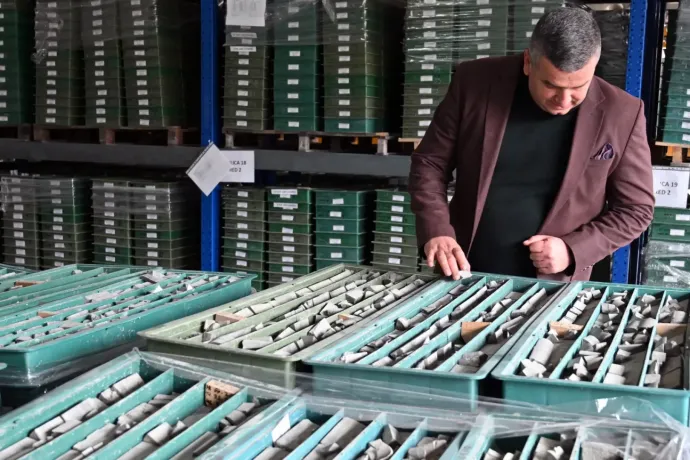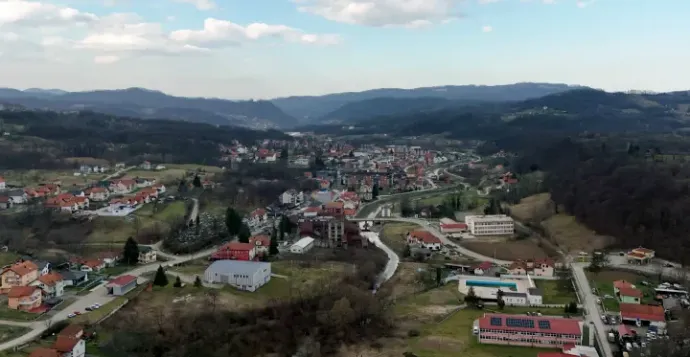
Over the past few years, we have often written about the good relationship between Hungarian Prime Minister Viktor Orbán and Milorad Dodik, the leader of Republika Srpska (RS), the Serb entity in Bosnia and Herzegovina. We have tried to decipher whether there could be a potential economic objective for Hungary behind it all, especially since other than the Prime Minister, Minister for Foreign Affairs and Trade Péter Szijjártó has also been in frequent talks with Bosnian Serb politicians. In April, for example, they both visited the heart of the RS in Banja Luka, where Viktor Orbán received the entity's highest honor.
For some time now, there have been hints in the Bosnian Serb press that a major economic cooperation could be in the works, which could establish a basis for the joint extraction of raw materials, including lithium, from the territory of the RS.
Lithium is an important raw material for the batteries that power electric vehicles, often referred to as white gold because of its limited availability and distinctive white colour.
More and more signs
The most comprehensive article on the subject was published by Átlátszó Vajdaság at the end of June. The piece contained a good deal of specific information about the lithium deposits in the Bosnian Serb territory, but let us begin by reviewing some of the hints we have gathered which suggest that something more serious may be brewing. When Péter Szijjártó visited Milorad Dodik at the end of January this year, Slobodna Evropa quoted Milorad Dodik as saying that “One of the projects that will form the basis of the future cooperation between the Republika Srpska and Hungary is the development of a strategy for the exploitation of our mining deposits.”
It was three months later that both Orbán and Szijjártó were present for a large-scale joint economic forum, after which RS Prime Minister Radovan Višković said: “In the coming period, along with our Hungarian partners, we will be able to exploit all the treasures that are located in the area around Ozren, Lopare, Jezero, Mrkonjić Grad, Rudo, Čajniče and Zvornik.”
While the names of these places are probably not very well known abroad, they are worth looking up. They are located in the northern and eastern part of Bosnia and Herzegovina, nestled among beautiful mountains, but we listed them primarily because one of them, Lopare, will be of great importance in this article.
While the above statements did not specifically refer to cooperation on lithium, it is currently the most exciting subject when it comes to mining, both in Serbia and in Republika Srpska, and the major Bosnian deposit is in Lopare.
The great Serbian lithium dispute
It's hardly a surprise that both in Serbia and the Republika Srpska there has been a lot of controversy and huge protests surrounding the new mines, as experience in countries with large lithium deposits shows that mining this material places a huge burden on the environment. Thus, Serbs are rightly concerned about landscape contamination, potential landslides, water consumption and possible subsequent water contamination.
However, the extraction, at least in Serbia, would also be supported by the European Union. While politicians speaking out on the issue have always been vocal about the importance of a maximally green approach, they also attach great importance to lithium, which is essential for European battery production but is scarce on the continent.
Many have paid a visit to Serbia recently related to lithium mining, and as Politico reported, German Chancellor Olaf Scholz and Serbian President Aleksandar Vucic even signed a document about this in July. Hungarian involvement would also make sense, since Hungary is already a major power in battery production and intends to further strengthen this position.
The biggest lithium reserves in Serbia are in the western Jadar region. We won't go into details on this, but it is worth noting that Serbia has previously decided that the deposit, which has been known for a long time, should not be extracted. Despite this, the plan has now been dusted off, and the decision was welcomed by both German Chancellor Olaf Scholz and European Commission Vice-President Maroš Šefčovič. Not coincidentally, one of the continent's largest potential lithium mines (another major deposit is located near the Czech-German border) would help European sovereignty on lithium, (which is still far from being realized), as the vast majority of lithium used in global battery production is still coming from South America and Australia.

Šefčovič and Serbia's Minister of Mining and Energy Dubravka Đedović Handanović are envisioning an EU supply chain for lithium which would include the British-Australian mining consortium Rio Tinto. The project is already so far ahead that the prospective customers are also known. They could – at least according to the plans – be the German car maker Mercedes-Benz and the French-Italian car maker Stellantis (the maker of Fiat, Alfa Romeo, Citroën, Lancia, etc.).
The environmental concerns mentioned are fairly strong, but the Serbian public is also bothered by the EU's reluctance to take them in while wanting their natural resources. The Serbian opposition, on the other hand, is bothered by the fact that Aleksandar Vučić is very eager to make it all happen, and has actually announced that he would personally oversee the project. In short: many Serbs genuinely dislike the project, but turning down a new investment worth EUR 6 billion is difficult for any politician.
In Hungary, the MOL group has previously embarked on an experimental lithium extraction project in Pusztaföldvár, which Portfolio has written about in detail. Basically, there are two technological options for the extraction of lithium: the Serbian and Bosnian projects are mining technologies with more environmental risks but leading to higher volumes, while the other technology, used in the Hungarian pilot project is extracting lithium from geothermal water. This, according to Mol, has a lower environmental risk but is also more expensive, and the latest published reports suggest that they are still assessing how economically viable the project would be. In any case, if the domestic amount does end up being extracted, previous calculations suggest that it would at the most be enough to power batteries for the domestic demand for electric cars.
Meanwhile in Bosnia
But how does Republika Srpska factor into the picture? The article in Átlátszó shows very accurately that the Bosnian Serbs are in fact in a situation that is rather similar to the one in Serbia: lithium has been found, the population and environmental activists are protesting, but for now, Milorad Dodik has used all kinds of tricks to give the green light to extraction. The town of Lopare itself, lead by its mayor has protested vehemently against the mine, but the citizens' initiatives have so far been ignored by the authoritarian state.
Incidentally, the site in Lopare is almost adjacent to the Serbian deposit, as it sits just across the border on Mount Majevica in north-eastern Bosnia and Herzegovina. This is located in the Dinari Mountains, and the part on the Serbian side of the border, where the Serbian lithium source, the Jadar Valley is located, is called Mount Iverak. According to Milorad Dodik, the mineral resources in this 25 square kilometre extraction area in Bosnia are worth EUR 15 billion and could be extracted within the next 50 years.
The geological exploration of the Bosnian mineral deposits was carried out by the Croatian subsidiary of the Swiss company Arcore AG. The Swiss company is also registered in Zug, as are most of the world's commodity firms and energy traders (including MET, which has a Hungarian background). Arcore intends to mine in partnership with Rock Tech Lithium, which is listed on the Canadian stock exchange.
Dodik enthusiastically welcomed the recent memorandum of understanding between the EU and Serbia and added that the Republika Srpska is ready and willing to participate in this partnership with Serbia. He also said:
"along with our Hungarian partners, we will keep an eye on the Serbian government's decisions in this regard".
So for the time being, there is no talk about the Serbian and Bosnian Serb project being in the same hands, but the two entities, Serbia and the RS are very keen to cooperate, having also just recently signed a resolution on the unity of the Serbian people.
Hungary's potential role
How could Hungary be involved in this? As we have seen, Dodik has already publicly floated the idea of a Hungarian role in the story. The diplomatic relationship between the parties is a good one, leading politicians meet regularly, and Hungary often extends political gestures to the Bosnian Serbs that are difficult for the West to understand. The most embarrassing of these was when, on 23 May, the United Nations (UN) General Assembly voted on declaring 11 July the International Day of Commemoration of the 1995 Srebrenica genocide, which was committed by Bosnian Serbs against local Bosniaks. Under the resolution, the international day of remembrance will be on 11 July, but Hungary – the only EU and NATO member to do so – did not support the resolution.
It would have been difficult to explain that what happened in Srebrenica was anything other than genocide, but Minister of Foreign Affairs and Trade Péter Szijjártó did not dispute that, but rather questioned whether such a resolution would contribute to peace and stability in the Western Balkans thirty years later, or whether it would stir up conflict again. It is hardly necessary to detail the negative reactions to the Hungarian opinion among the Bosniaks.

In addition to the diplomatic front, Hungary has often helped the Dodik administration out financially, for example with grant applications and a very favourable ten-year loan, but it has also been involved in some energy projects in a country known for its chaotic regulations and its rather unregulated and unreliable financial situation. One such example is that of the Trebinje solar power plant, the prospects for which are somewhat clouded by the fact that businessman Roland Lugos, who owns the Hungarian company involved in the project is facing serious difficulties due to the liquidation of his main company, Optimum Solar. But there has also been talk of a Hungarian role in several renewable projects that were previously started with German funding but which Germany has backed out of. These included the Hrgud wind farm in Berkovići and the Gradiška wastewater treatment project. A local article on 16 August reported that
'Hungary's Mezei-Vill Ltd. is particularly interested in participating in projects related to the mining and extraction of iron ore around Prijedor and solar energy'.
Rough terrain
In any case, before one becomes overly enthusiastic about a cooperation based on great friendship and future Hungarian projects in foreign markets, those who have tried to do business in the region urge caution. Although it is a fact that some enthusiastic pioneers believe in the region, even they have cited local corruption as a problem, as well as the 'extremely complicated' regulations, which are a mix of all kinds of municipal and Bosnian Serb legislation as well as those of the common state, all of which sometimes contradict each other. Another thing that is often brought up is the serious interethnic tensions, the unskilled labour force and the volatility of commitments.
Hungary would certainly greatly benefit from the ability to access the lithium that is located in what is now 'friendly' territory for the government, but it is too early to talk about this, as the Republika Srpska has not yet put out a tender for lithium extraction. However, a small local newspaper, the portal of the town of Bijeljina, recently reported that Petar Đokić, the Minister of Energy and Mining of the Republika Srpska, met with Csaba Lantos, the Hungarian Minister of Energy, Péter Holicza, the Energy Ministry's Deputy State Secretary for EU Affairs, and Gergely Horváth, the Director of MVM (state owned Hungarian energy provider and Hungary’s second biggest company). According to the report, they confirmed mutual willingness to continue cooperation between the Republika Srpska and Hungary, for which the article forecast a written agreement for September.
"There is mutual interest for cooperation in the field of mining. In light of our current results, this specifically applies to geological surveys in the territory of Republika Srpska. The Hungarians are currently studying the feasibility of the projects presented to them," Petar Đokić said after the meeting.
For more quick, accurate and impartial news from and about Hungary, subscribe to the Telex English newsletter!